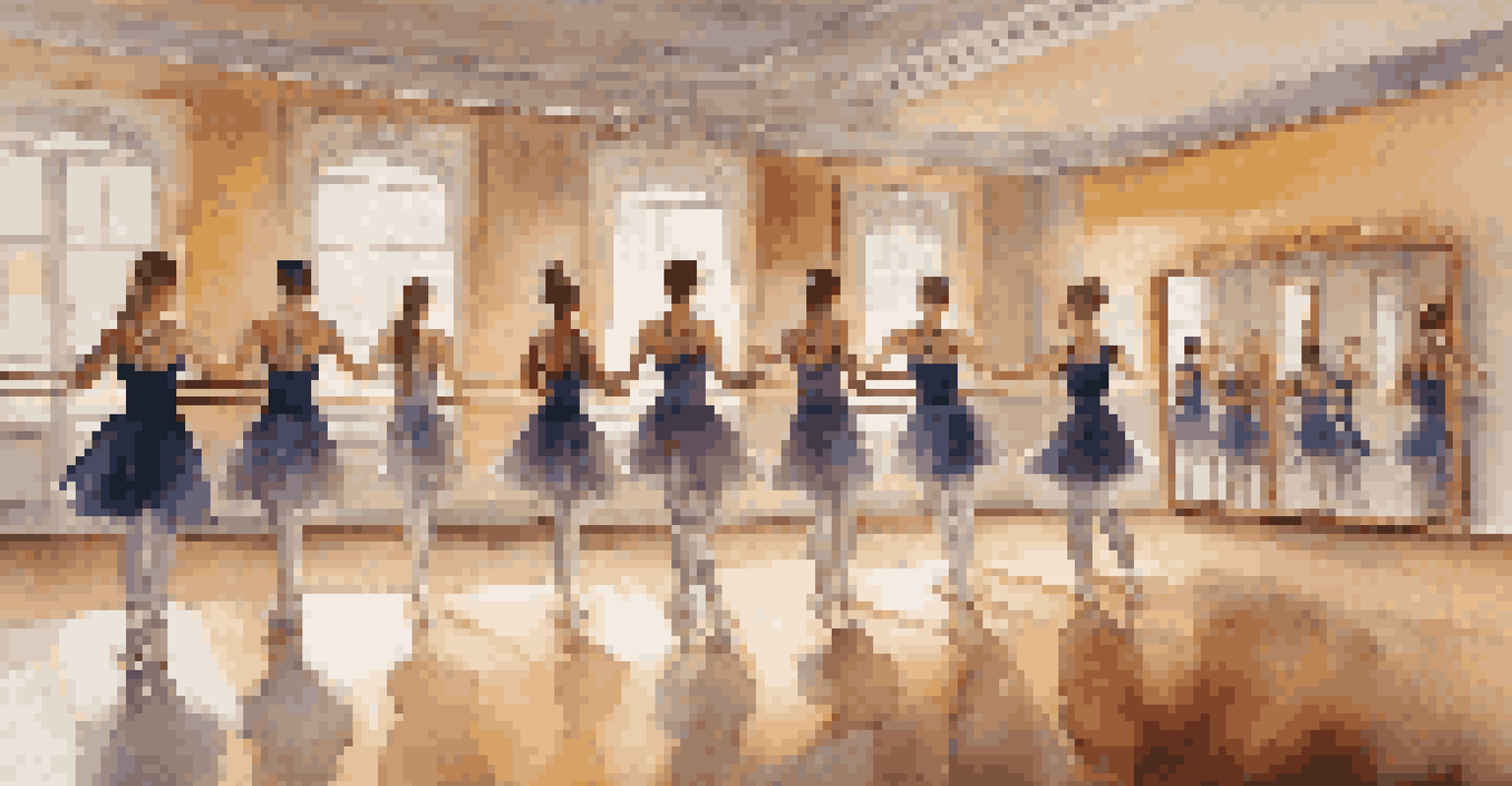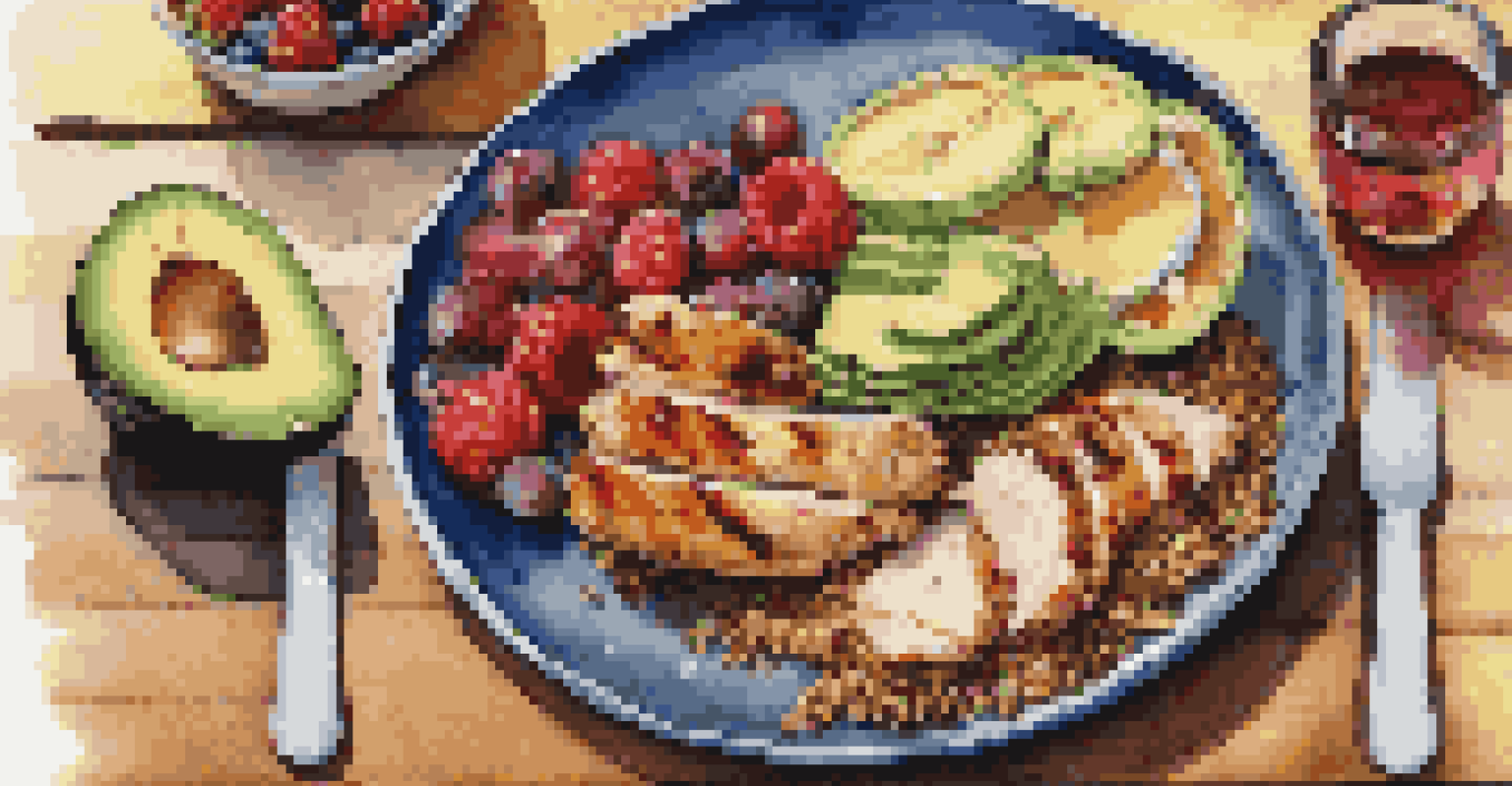The Psychological Impact of Nutrition on Dancers' Performance

Understanding the Connection Between Nutrition and Dance
Nutrition is the foundation of a dancer’s performance, affecting both body and mind. Just as a car needs fuel to run, dancers need proper nutrition to thrive. When dancers nourish their bodies with the right foods, they can enhance their physical abilities and mental focus.
Let food be thy medicine and medicine be thy food.
A well-balanced diet provides the energy needed for rigorous rehearsals and performances. Without adequate nutrition, dancers may experience fatigue, which can lead to decreased performance and higher risks of injury. This connection highlights the importance of understanding how what we eat impacts our ability to dance.
Moreover, nutrition doesn’t just influence how dancers move; it also affects their mood and motivation. A nutritious diet can lead to improved mental clarity, allowing dancers to concentrate better during practice and performance.
The Role of Macronutrients in Dancers' Well-Being
Macronutrients—carbohydrates, proteins, and fats—are essential for dancers. Carbohydrates are the primary source of energy, fueling muscles during high-intensity dance routines. When dancers consume enough carbs, they can sustain their energy levels and perform at their best.

Proteins play a crucial role in muscle repair and recovery. After an intense training session, dancers need protein to help their muscles recover and grow stronger. This is vital for maintaining peak physical condition and preventing injuries.
Nutrition Fuels Dance Performance
Proper nutrition enhances both physical abilities and mental focus, crucial for dancers during training and performances.
Fats, while often misunderstood, are also important as they provide long-lasting energy and support cell function. A balanced intake of all three macronutrients can create a solid nutritional foundation for a dancer’s performance and mental health.
The Importance of Micronutrients for Optimal Performance
Micronutrients, including vitamins and minerals, are just as crucial for dancers as macronutrients. These nutrients support various bodily functions, including energy production and immune health. For example, vitamin D can enhance bone health, while iron is vital for oxygen transport in the blood.
You are what you eat, so don't be fast, cheap, easy, or fake.
Dancers often have high physical demands, making them susceptible to deficiencies that can affect performance. A lack of essential vitamins and minerals can lead to fatigue, weakness, and even mood swings. Therefore, it’s essential for dancers to include a variety of fruits and vegetables in their diet.
Incorporating a colorful array of foods can help dancers meet their micronutrient needs, ensuring they feel their best both physically and mentally. This holistic approach to nutrition can ultimately enhance performance on stage.
Hydration: A Key Element in Dance Nutrition
Hydration plays a significant role in a dancer's performance, influencing both physical and mental capabilities. Water is essential for maintaining bodily functions, and even slight dehydration can impair performance. Dancers should prioritize hydration before, during, and after practice to maintain optimal energy levels.
In addition to water, electrolytes are vital for muscle function and preventing cramps. Dancers may require electrolyte-rich beverages, especially after long rehearsals or performances. Keeping an eye on hydration can be the difference between a stellar performance and feeling sluggish on stage.
Macronutrients Are Essential
Carbohydrates, proteins, and fats provide the necessary energy and support muscle recovery for optimal performance.
Moreover, proper hydration can also support cognitive functions, such as concentration and reaction time. By staying adequately hydrated, dancers can ensure they perform at their best, both physically and mentally.
The Psychological Effects of Diet on Dancers
Diet can significantly influence a dancer's mindset and emotional state. Eating nourishing foods can lead to improved self-esteem and body image, which is crucial in a field where appearance often takes center stage. When dancers feel good about what they eat, they tend to feel more confident on stage.
Conversely, restrictive diets can lead to negative feelings about food and body image, potentially causing anxiety or stress. It’s important for dancers to develop a healthy relationship with food, seeing it as fuel rather than something to be feared or avoided.
By fostering a positive attitude towards nutrition, dancers can cultivate a healthier mental space that enhances their performance. This mental clarity can lead to a more enjoyable dancing experience overall.
Building Healthy Eating Habits for Dancers
Developing healthy eating habits is essential for dancers to sustain their performance and well-being. Planning meals ahead of time can help dancers ensure they have access to nutritious foods, even during busy schedules. Simple steps like prepping snacks or cooking in bulk can make a significant difference.
Mindful eating is another practice that can greatly benefit dancers. By paying attention to hunger cues and savoring meals, dancers can cultivate a better understanding of their nutritional needs. This approach can also reduce the tendency to eat mindlessly, which can lead to unhealthy choices.
Hydration Affects Performance
Staying properly hydrated is vital for maintaining energy levels and cognitive function during dance.
Lastly, seeking guidance from nutritionists or dietitians can be a valuable resource. These professionals can help dancers create personalized meal plans that cater to their specific needs, ensuring they fuel their bodies for optimal performance.
Creating a Balanced Nutrition Plan for Dancers
A balanced nutrition plan is crucial for dancers, combining various food groups to meet their energy and nutrient needs. Dancers should focus on incorporating whole foods, such as lean proteins, whole grains, healthy fats, and plenty of fruits and vegetables. This diverse diet can help provide the energy required for both training and performance.
It’s also important to listen to the body and adjust the nutrition plan based on activity levels. For example, during intense training periods, dancers may need to increase their carbohydrate intake to fuel their workouts effectively. Flexibility in a nutrition plan can help dancers adapt to their changing needs.

Finally, emphasizing consistency over perfection is key. Making gradual changes and maintaining a balanced approach to eating can lead to long-term success, allowing dancers to perform at their best without feeling overwhelmed by strict dietary rules.